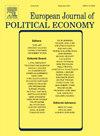The “German Vote” and its consequences: (Un)reliable parties in multilateral bargaining under private information
IF 2.4
3区 经济学
Q2 ECONOMICS
引用次数: 0
Abstract
This paper theoretically investigates the strategic implications of varying reliability of bargaining partners under unanimous and non-unanimous voting. In a sequential two-period model, three players (one proposer, two responders) bargain over the distribution of a pie. One responder has private information about his valuation of finding an agreement, implying signaling values that differ substantially between voting rules and are affected by the other responder’s reliability. The other responder is of a non-strategic “robot” type, who is unreliable in the sense that in the first period, he may vote “no” after announcing a “yes”-vote. Under unanimity rule, the responder with private information benefits from voting “no” because this signals that he requires a larger compensation in a future period. In contrast, under majority rule, voting “no” is unattractive due to the fear of being excluded from a future coalition. Under both voting rules, one responder becoming less reliable negatively affects the other responder’s willingness to vote “yes”, making efficient agreements increasingly difficult to achieve. Under majority rule, the presence of unreliable parties can lead to more parties being included in the winning coalition, as demonstrated by an extension of the model. However, some of these insights are contingent on the specific assumptions of the model.
“德国投票”及其后果:私人信息下多边谈判中不可靠的各方
本文从理论上研究了协商伙伴在一致投票和非一致投票情况下的不同可靠性的战略含义。在连续两期模型中,三个参与者(一个提议者,两个回应者)就馅饼的分配进行讨价还价。一个响应者有关于他找到协议的估值的私人信息,这意味着在投票规则之间的信号值存在很大差异,并受到另一个响应者的可靠性的影响。另一个应答者是一个非战略性的“机器人”类型,他是不可靠的,因为在第一阶段,他可能在宣布“赞成”投票后投“反对”票。在一致同意原则下,拥有私人信息的回答者会从投“不”票中受益,因为这表明他在未来一段时间内需要更大的补偿。相比之下,在多数决定原则下,由于担心被排除在未来的联合政府之外,投反对票是没有吸引力的。在这两种投票规则下,一个应答者变得不那么可靠会对另一个应答者投赞成票的意愿产生负面影响,使有效的协议越来越难以达成。在多数决定原则下,不可靠政党的存在可能导致更多政党被纳入获胜的联盟,正如该模型的扩展所证明的那样。然而,其中一些见解取决于模型的特定假设。
本文章由计算机程序翻译,如有差异,请以英文原文为准。
求助全文
约1分钟内获得全文
求助全文
来源期刊

European Journal of Political Economy
Multiple-
CiteScore
3.40
自引率
10.00%
发文量
106
期刊介绍:
The aim of the European Journal of Political Economy is to disseminate original theoretical and empirical research on economic phenomena within a scope that encompasses collective decision making, political behavior, and the role of institutions. Contributions are invited from the international community of researchers. Manuscripts must be published in English. Starting 2008, the European Journal of Political Economy is indexed in the Social Sciences Citation Index published by Thomson Scientific (formerly ISI).
 求助内容:
求助内容: 应助结果提醒方式:
应助结果提醒方式:


